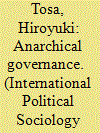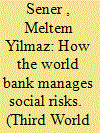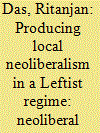| Srl | Item |
| 1 |
ID:
092298


|
|
|
|
|
| Publication |
2009.
|
| Summary/Abstract |
Beside the promotion of a politics of inclusion, implemented by governing at a distance, the global governmentality also promotes a politics of exclusion, such as establishing targeted governance that is aimed at deviant groups at the periphery of global politics. This highly disciplinary social control that is imposed upon the marginalized population sometimes leads to instances of the state of exception, in which people are forced to endure "bare lives." This kind of exception existing at the marginalized periphery of the neoliberal global governmentality becomes normal. This neoliberal governmentality creates an informal sector of an enormous scale, whose spatial representation is the global slum, and where vicious cycles of violence become normal.
|
|
|
|
|
|
|
|
|
|
|
|
|
|
|
|
| 2 |
ID:
139021


|
|
|
|
|
| Summary/Abstract |
This paper aims to assess the World Bank’s social risk management approach to poverty by focusing on the implementation details of the Social Risk Mitigation Project in Turkey, a World Bank project that depends on this approach. The paper looks at the approach through the concept of neoliberal governmentality, as an attempt to produce responsible poor citizens during a period when the responsibility for providing social services is transferred to the market and the family. By using field research it demonstrates that, with the intervention of local factors, several unintended consequences emerge in the implementation of a social risk management project. The article concludes that these outcomes, although not planned or intended, have all been instrumental in depoliticising poverty and the poor in the country. Moreover, in spite of all the problems and dissatisfaction, thanks to the Bank’s own portrayal, this project has contributed to the image of the Bank as a development institution that achieves successes in its fight with poverty.
|
|
|
|
|
|
|
|
|
|
|
|
|
|
|
|
| 3 |
ID:
168569


|
|
|
|
|
| Summary/Abstract |
This paper presents a theoretical reassessment of a contentious chapter in India’s economic liberalisation – the case of West Bengal, a state ruled by the pro-labour ‘Left Front’ coalition, led by the Communist Party of India-Marxist (CPIM) from 1997 to 2011. The onset of neoliberalism in India had naturally created a serious political dilemma for the CPIM, but it eventually transitioned to a private-industrialisation agenda, thus prompting serious questions of ideological deviation. While the political-economy of the CPIM/Left Front and its industrial fortunes have been extensively scrutinised, this study introduces a rather different theoretical perspective to the story. Going back to the initial period of policy transition (c.1994), it uses the analytical categories of local neoliberalisms and populist transition to show how the state of affairs in West Bengal under the CPIM was demonstrative of a particular variant of interventionist neoliberal governmentality, characterised by a gradual intensification of pro-market impulses. Furthermore, the study also contextualises West Bengal within wider political economic trends, arguing that pro-market transitions by populist regimes tend to be characterised by a series of mobile calculative techniques of governing, embedded in local historical and geographical specificities and localised relationships.
|
|
|
|
|
|
|
|
|
|
|
|
|
|
|
|